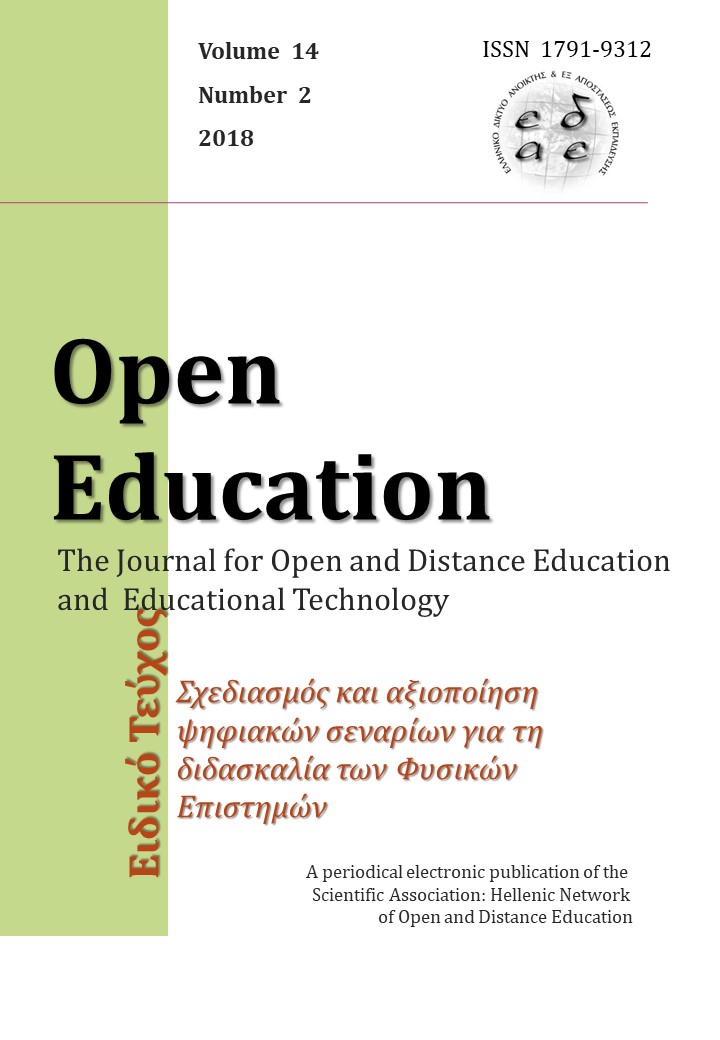Digital Scenarios Physics in Primary Education through the AISOPOS Platform. Comments from Classroom Application
Abstract
The platform AESOP (Advanced Electronic Scenarios Operating Platform) http://aesop.iep.edu.gr/ was created by the Institute of Educational Policy of Greece with the ambition not only to be a digital educational material hub, but also a useful tool for the design, development, evaluation and presentation of digital teaching scenarios using modern web tools. The technological capabilities offered by the platform allow the synthesis of teaching scenarios by incorporating learning objects from different sources and the transformation of other digital material by scenarios writers / creators using the tools available. In order to have a unified and modern effective approach to digital material, the development of standards per cognitive subject was preceded by the fact that the digital teaching scenarios presented in it are in line with modern pedagogical approaches and practices of integrating digital material into educational practice. Moreover, the material created before being openly used in the educational community was evaluated for its compatibility with the curricula and its scientific competence.
The educational approaches proposed concept to science teaching and are largely adopted by the curriculum of compulsory education promote Inquiry Based Science Education, collaborative approaches, active participation and self-development by students. The curricula of primary education existing in Greece have this orientation. Educational research has shown that teachers consider the transition to exploratory processes positive (Plakitsi, et al., 2013) but have difficulties in their implementation. The main difficulties are the lack of time, the difficulty of managing multiple sources and the change of the educational environment. The existence of a large amount of educational material does not ensure that it is used in the classroom in a systematic way, on the contrary, in many cases it comes to reinforce the teacher-centered teaching model or to substitute pupils' experimental activities with the projection of videotaped material. The indicative study of the "Sounds So Well-known and So Unknown" that is exemplary for Primary Education Physics shows a clear correlation of the learning outcomes sought with the activities proposed and its construction based on scientific methodology observation, concentration - information use, hypothesis, experimental control, analysis and interpretation of data, conclusions, generalization).
In this we use digital learning objects from various repositories, with interactive activities composed by the scriptwriter, while experimenting with students with simple materials. In addition, they are presented the different methodological approaches that have been implemented, after it in the classroom for four years and the main observations in relation to this application. Different approaches include a. application in the laboratory with two pupils per group and one computer per group, b. the use of a computer per class with an interactive table and worksheets and c. a form of Flipped Classroom order with students getting in touch with the educational material over the Internet at home before and after the lesson in class. The application in the classroom has highlighted the problems and positive aspects of each approach with the flipping class seeming to be the most effective both in terms of time and in terms of attracting students' interest. Recapitulating, the AESOP platform provides a framework, educational and technical, for the development and provision of complex digital educational scenarios. The combined evaluation of the scenarios ensures to the highest degree both their reliability and their educational value. We must not forget that each class is "alive", so their use and the methodology of their integration into the educational process should be commensurate with the needs of each class and the available technological infrastructure. In any case, we cannot consider that the scenarios to be "panacea" but a safe basis for the use of digital material integrated into modern educational approaches.
Article Details
- How to Cite
-
Πατρινόπουλος Μ. (2018). Digital Scenarios Physics in Primary Education through the AISOPOS Platform. Comments from Classroom Application. Open Education: The Journal for Open and Distance Education and Educational Technology, 14(2), 62–75. https://doi.org/10.12681/jode.19005
- Issue
- Vol. 14 No. 2 (2018)
- Section
- Section 1
Copyright Notice
Authors who publish with this journal agree to the following terms:
Authors retain copyright and grant the journal right of first publication with the work simultaneously licensed under a Creative Commons Attribution Non-Commercial License that allows others to share the work with an acknowledgement of the work's authorship and initial publication in this journal.
Authors are able to enter into separate, additional contractual arrangements for the non-exclusive distribution of the journal's published version of the work (e.g. post it to an institutional repository or publish it in a book), with an acknowledgement of its initial publication in this journal.
Authors are permitted and encouraged to post their work online (preferably in institutional repositories or on their website) prior to and during the submission process, as it can lead to productive exchanges, as well as earlier and greater citation of published work.



